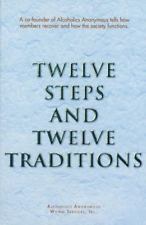
"For our group purpose, there is but one ultimate authority - a loving God as He may express Himself in our group conscience. Our leaders are but trusted servant; they do not govern."

 |
Tradition Two
"For our group purpose, there is but one ultimate authority - a loving God as He may express Himself in our group conscience. Our leaders are but trusted servant; they do not govern."
|
 |
Even the founders of an AA group are subject to recall by, and must answer to, the group conscience. This is reinforced by Tradition One, where it is suggested that the individual put aside his own desires for the good of the group. In Tradition Twelve it is also recommended that we emphasize "principles over personality." A former leader with experience is praised here, if he is "willing to wait on the sideline patiently awaiting developments." Elder Statesmen "do not drive by mandate; they lead by example." Those who feel self-pity over losing power or try to regain it are derided as "bleeding deacons."
The author relates the experience of an early A.A. member (Bill W himself) in the early days of the New York group before the Big Book. He was offered a job counseling alcoholics professionally. Everything being ethical and straightforward, he was ready to accept the position. When he discussed it with newcomers at that night's meeting, however, objections were raised over professionalism. This was long before Tradition Eight was conceived, and even before the issue was raised in There is a Solution. (Page 19) In any event, Bill was persuaded, and declined the offer. An account of this event can be found in Pass It On, Page 175-177.
The reader may properly infer that if a co-founder of Alcoholics Anonymous can make such a personal sacrifice while conforming to the group conscience, anyone else can do so. Thus did Bill "lead by example."
As a matter of historical note, this Tradition would later become the basis of the Twelve Concepts for World Service, A.A.'s Third Legacy.